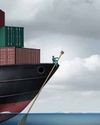
We have performed in a way which I would like to term as “mediocre” considering Indian economy that is already in a downward trajectory and our trade is just a part of it. Apart from that in the eastern region, overcapacity is a matter of concern compared to the movement of containerised cargo especially through Kolkata Port (riverine port). This has undoubtedly increased competitiveness in the industry.
This year may not prove to be better than last year due to other stresses e.g. import restrictions, corona virus issue in China & its effect going forward and a falling curve in Indian economic cycle.
Q. Tell us about your CFS operations? Which hinterland does it cover and which commodities are largely moved through the CFS? What are the EXIM cargo volumes moved by the CFS last year?
The CFS operations chiefly encompasses import cargo starting from transportation from Kolkata and Haldia Dock to CFS Gate-in with all necessary custom formalities and thereafter stacking at open yard or in warehouse after destuffing. The whole operation is backed by Phonex ERP. Every segment of operation is recorded in ERP till the time of gate-out of import containers or cargo. We have a team of qualified and well-trained officers to supervise piece-wise operation of Import and Export cargo touching through our CFS. For the ease of doing work, we have also created separate office for CHA, Shipping Line, MLO and other stakeholders including Customs Officials. To ensure queries to get answered on time, we have a 24X7 helpline for the stakeholders and an online access to record of containers through website and android app.
The commodities are largely moved through our CFS to the rest of West Bengal, Orissa & North East states.
Denne historien er fra March 2020-utgaven av Maritime Gateway.
Start din 7-dagers gratis prøveperiode på Magzter GOLD for å få tilgang til tusenvis av utvalgte premiumhistorier og 9000+ magasiner og aviser.
Allerede abonnent ? Logg på
Denne historien er fra March 2020-utgaven av Maritime Gateway.
Start din 7-dagers gratis prøveperiode på Magzter GOLD for å få tilgang til tusenvis av utvalgte premiumhistorier og 9000+ magasiner og aviser.
Allerede abonnent? Logg på

Impact Of Covid-19 On Shipping And Logistics
Industry stalwarts discuss threadbare the prevailing logistics and supply chain scenario and issues in clearing cargo during the COVID-19 lockdown

Digital Platforms Defy Lockdown
Digital trading modules such as eNAM are enabling farmers to move their produce from farm to market even during the lockdown

GARMENT TRADE TRAMPLED
As retailers face a shutdown in US and Europe, the cascading affect has caused mass cancellation of orders in Bangladesh

TRADE RESUMES WITH CHINA
While India has allowed uninterrupted movement of imports into Nepal even during lockdown, China is reopening its borders as it emerges from the pandemic
LESS HUMAN INTENSIVE, MORE DATA DRIVEN
AI provides transformational opportunity for logistics industry by improving customer experience, operational efficiency, faster turnaround time and lower cost while ensuring security and transparency. Macro environment requires industry to transform to be less human intensive, agile and data driven, all of which can be accelerated by AI adoption, shares Gangadhar Gude, Founder & CEO, atai.ai

SHAKEN AND STIRRED
The COVID-19 pandemic has partially paralysed the logistics and supply chain, but the industry is still deterred to ensure supply of essentials continues

TRADE STUCK, ECONOMY SLOWS DOWN
Sri Lankan economy slows down as trade deficit widens and supply chain disrupts amidst lockdown

LENDING INTELLIGENCE TO SUPPLY CHAIN
If you’re shipping millions of dollars’ worth of pharmaceuticals, high-end electronics, expensive seafood, or precious metals, what would you be willing to pay for the ability to ‘ask’ your shipment where it is right now and whether it’s ok? What would you pay for a freight smart enough to raise an alarm before it spoils? Artificial Intelligence enables that and much more…

CONTAINER LINES SIGNAL ‘SOS'
As the per-unit cost of operations increases many lines are forced to blank sailings which has hit their bottom line real hard. The Government and Terminal Operators therefore need to actively consider reduction in Vessel Related Costs

IMO 2020 And The Covid-19 Curse
The COVID-19 outbreak has shaken and stirred the already volatile bunker market. While the refiners adjust their capacities and shipping lines choose their path to compliance, the market dynamics are yet to reach an equilibrium